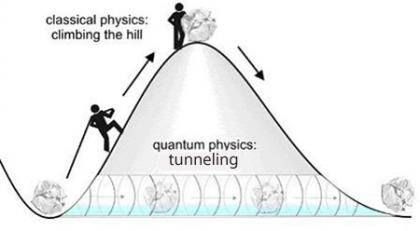According to Albert Chang, a physicist at Duke University and the leader of the study, this finding could assist researchers in eliminating phase slips from nano-scale devices, which in turn results in more dependable nanowires and highly efficient nano-electronic devices.
Macroscopic quantum tunneling effect was first demonstrated in a device known as a Josephson junction, which features a thin insulating layer linking two superconductors that have a three-dimensional shape and a width of several nanometers.
 Physicists observed millions of electrons tunneling together through an energy barrier
Physicists observed millions of electrons tunneling together through an energy barrier
To observe phase slips and macroscopic quantum tunneling effects in a simple system, Chang team utilized individual, one-dimensional aluminum nanowires having widths ranging from 5 to10 nm and length ranging from1.5-10 µm. These nanowires were then cooled to temperatures near absolute zero, approximately 1° K or −458° F.
At this temperature, the crystal lattice of a metal vibrates in a manner that enables electrons to surmount the negative repulsion between them, resulting in the pairing of electrons and flowing of electric current without any resistance, eventually forming a superconductor. While moving in a quantum-mechanical space, electrons have to scale a wall or a barrier, resulting in the consumption of energy and release of heat. The resulting heat due to consecutive scaling attempts causes a phase slip to a non-superconducting state from a superconducting state in a part of the naonwire.
Chang team’s altered the amount of current and temperatures via the aluminum nanowires to accurately demonstrate the occurrence of phase slips. The findings showed that at higher temperatures in the range of 1.5° K and near the critical temperature at which the wires have naturally a non-superconducting state, electrons have sufficient energy to shift over the barrier that maintains the stability of the superconducting current and the pairing of electrons.
When the nanowires cool below 1° K, electrons did not have the energy to scale the barrier and they tunnel or pass through the barrier together simultaneously, stated Gleb Finkelstein, a physicist at Duke University and a partner of Chang. The study also demonstrated that at moderately higher temperatures, single jumps over the barrier did not produce sufficient heat to cause the phase slip and breakdown superconductivity but multiple jumps did.
Investigating the behavior of electrons at specific temperatures offers researchers with information to develop ultrathin superconducting wires without phase slips. These enhanced wires could be utilized in ultra-compact electrical components for ultra-compact electronics such as the quantum bit in a quantum computer, Chang added.